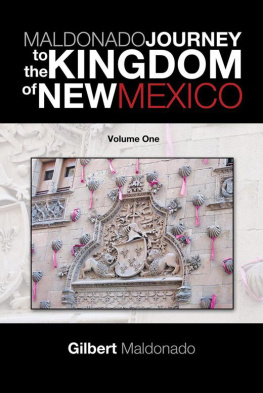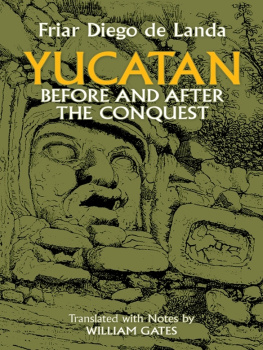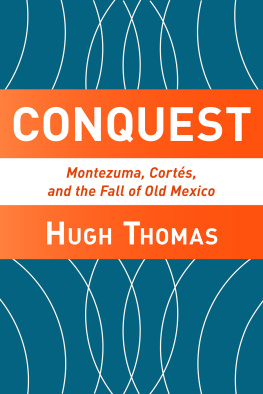
THE CONQUEST OF NEW SPAIN
ADVISORY EDITOR: BETTY RADICE
BERNAL DAZ DEL CASTILLO was born in Medina del Campo, Spain, in 1492. After participating in two explorations of the Mexican coast, he joined Cortes in the march on Mexico and the battles for the city. He began his History of the Conquest of New Spain when he was over seventy, and the last survivor of the Conquerors of Mexico. Fearing his literary abilities were not up to the task, he nearly abandoned the work, but resumed it because he felt that the other chroniclers of the period had not represented it accurately. He had received a municipal office in Guatemala and a grant of Indians, but his great estates did not yield him much wealth. He died in about 1580.
J. M. COHEN, born in London in 1903 and a Cambridge graduate, was the author of many Penguin translations, including versions of Cervantes, Rabelais and Montaigne. For some years he assisted E. V. Rieu in editing the Penguin Classics. He collected the three books of Comic and Curious Verse and anthologies of Latin American and Cuban writing, and frequently visited Spain and made several visits to Mexico, Cuba and other Spanish American countries. With his son Mark he edited the Penguin Dictionary of Quotations and its companion Dictionary of Modern Quotations. J. M. Cohen died in 1989. The Times obituary described him as the translator of the foreign prose classics for our times and one of the last great English men of letters, while the Independent wrote that his influence will be felt for generations to come.
BERNAL DAZ
THE CONQUEST OF NEW SPAIN
TRANSLATED WITH AN INTRODUCTION BY
J. M. COHEN
PENGUIN BOOKS
PENGUIN BOOKS
Published by the Penguin Group
Penguin Books Ltd, 80 Strand, London WC2R 0RL, England
Penguin Putnam Inc., 375 Hudson Street, New York, New York 10014, USA
Penguin Books Australia Ltd, 250 Camberwell Road, Camberwell, Victoria 3124, Australia
Penguin Books Canada Ltd, 10 Alcorn Avenue, Toronto, Ontario, Canada M4V 3B2
Penguin Books India (P) Ltd, 11 Community Centre, Panchsheel Park, New Delhi 110 017, India
Penguin Books (NZ) Ltd, Cnr Rosedale and Airborne Roads, Albany, Auckland, New Zealand
Penguin Books (South Africa) (Pty) Ltd, 24 Sturdee Avenue, Rosebank 2196, South Africa
Penguin Books Ltd, Registered Offices: 80 Strand, London WC2R 0RL, England
www.penguin.com
This translation first published 1963
42
Copyright J. M. Cohen, 1963
All rights reserved
Except in the United States of America, this book is sold subject
to the condition that it shall not, by way of trade or otherwise, be lent,
re-sold, hired out, or otherwise circulated without the publishers
prior consent in any form of binding or cover other than that in
which it is published and without a similar condition including this
condition being imposed on the subsequent purchaser
EISBN: 9780141913070
Contents
Map of Mexico city and Lake Texcoco at the time of the Spanish Conquest.
Introduction
BERNAL DIAZ DEL CASTILLO, the last survivor of the Conquerors of Mexico, died on his estates in Guatemala at the age of eighty-nine, as poor as he had lived. Born in 1492, the year in which Columbus discovered the New World, he survived to see a great part of America subjugated by Spain. But despite the leading role he had played in the heroic overthrow of the Aztec Empire, he left his family no other riches than his true and wonderful History of the Conquest of New Spain, of which he made his fair copy at the age of seventy-six, when he was, according to his own certainly exaggerated description, both deaf and blind, and to which he added his preliminary note at the age of eighty-four. He had been over seventy when he began it, and had at one point given it up. For on comparing the fine style of certain other chroniclers (who had told the story of Cortes achievement with less first-hand knowledge than he had) with the roughness and lack of polish of his own language, he had been discouraged.
Certainly Bernal Daz was not an accomplished stylist. He had, however, a graphic memory and a great sense of the dramatic. Moreover he was conscious of having taken part in a great achievement, unparalleled in modern history: the overthrow of a great Empire by a company of adventurers, inspired partly by a sense of mission and partly by a crude greed for gold. Their success, even their survival, could in his belief be accounted for only by the miraculous intervention of God and the Saints, who wished New Spain to be added to the realm of Christ and the Emperor Charles V.
So, when Bernal Daz found the story misrepresented by Cortes chaplain and official panegyrist, Francisco Lopez de Gomara, and also by Gonzalo de Illescas (who spoke the truth neither in the beginning, nor the middle, nor the end), he decided to resume his work and carry it to completion. Many times in the course of his History, he refers to these chroniclers, setting right their errors and often angrily accusing them of ignorance and malice. His purpose was by no means simply to vindicate his own part in the march on Mexico. True, he frequently informs the reader that Cortes consulted his captains and soldiers including himself at important junctures in the campaign, and did not, as Gomara asserted, make all his decisions alone. Bernal Daz, however, never attempts to claim a bigger role for himself than for his fellows and for long passages of his narrative he describes events at which he was not present, sometimes because of wounds, or in which his part is indicated only by the use of we or of us soldiers, where the stay-at-home historian would have had to write a plain the.
The narrative here translated covers the two preliminary explorations of the Mexican coast under Cordoba and Grijalva, with both of whom Bernal Daz served, the first march on Montezumas city, the Spaniards expulsion and flight, and their subsequent build-up of a new army, with which they captured the island-capital of the Empire which Guatemoc had now inherited from Montezuma. Bernal Daz History, however, is a much longer book than this. It covers the long tales of intrigue in Spain, Cuba, and Hispaniola, which almost succeeded in replacing Cortes by weaker leaders who would have been content to make a few modest settlements on the coast; and it continues after the final reduction of the Mexican capital to tell of further campaigns in search of the gold which had so far evaded the Conquerors. Bernal Daz describes also the terrible march through the forest of Honduras, Cortes final prosperity, and his own efforts on a visit to Spain to secure some better fortune for himself, the oldest Conquistador of New Spain, than what came to him from his estates and his magistracy in Guatemala.
By his own confession, as we saw, Bernal Daz was a poor stylist, and a retranslation of his whole narrative would have filled almost two volumes of this size. I have therefore pruned his story of repetitions and digressions, among other things cutting away his scoldings of Gomara and the other chroniclers and his frequent lists of men, horses, weapons, and provisions, which hold up the story. Where the omitted chapters contain facts essential to the understanding of events, I have given a brief account of them, in brackets, and I have ended my translation with Bernal Daz reflections on the capture of the Aztec capital. The rest can be read, by those who wish to know the tale of Cortes later campaigns and final triumph, in W. H. Prescotts classic,
Next page










